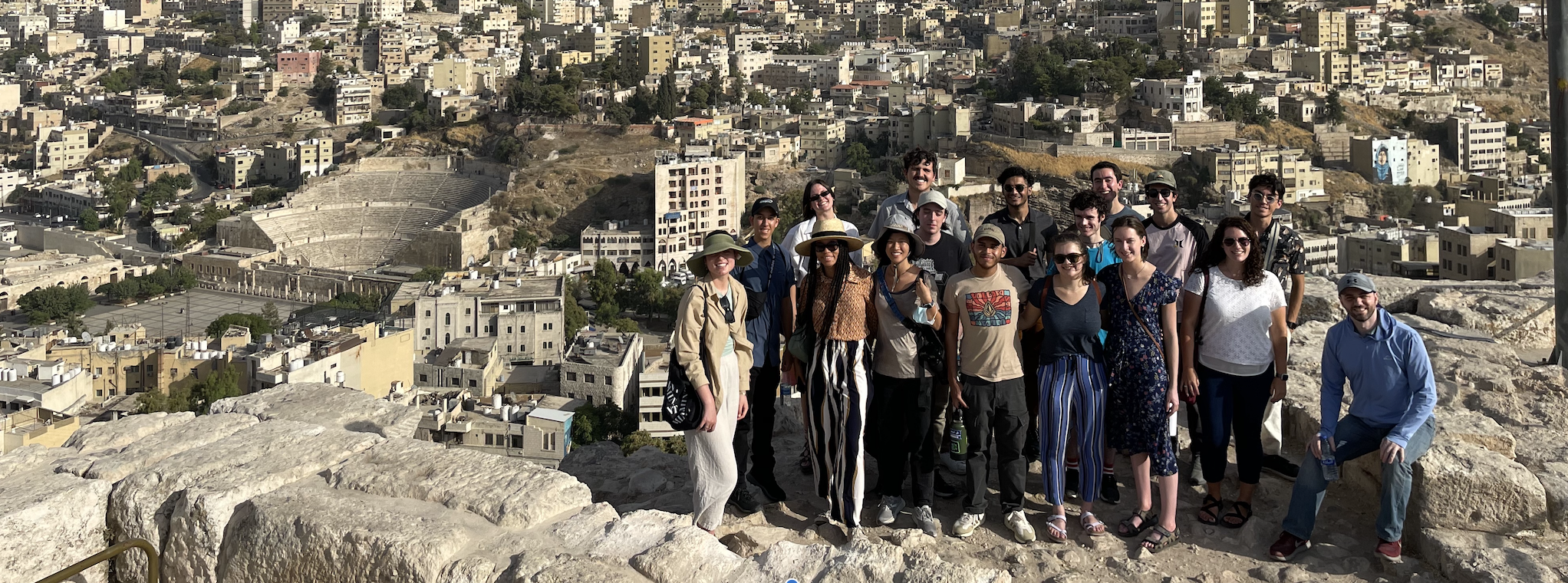History, Urbanity, and Performance in The Middle East
Program Quick Facts
- Location: Amman, Jordan
- Stanford Faculty Leaders: Samer Al-Saber
- Arrival Date: June 21, 2024
- Departure Date: July 13, 2024
- Program Cost: $600
- Academic Prerequisites
- Familiarity with Arabic is helpful and desirable, but not required.
- Activity Level:
- Light/Moderate. Activities may include city walking tours, easy/short hikes, museum, and other site visits, as well as optional physical activities such as longer walks.
- Centers for Disease Control and Prevention: Health Information for Travelers to Jordan
- US State Department Country Information: Jordan International Travel Information
- Visa Information: The Embassy of Jordan
- Application Deadline: Monday, January 29, 2024 at 11:59 am PT
General Description
The proposed course takes cultural artifacts as the foundational blocks of the Levant, asking a fundamental question about how a contemporary state exists on top and beside the ancient past, by exploring three cities: Petra, Jerash, and Amman. All three cities have large theatres that suggest a particular pattern of growth over time, and play a major role in how these cities function today as tourist attractions and a geography for performances of everyday life. In these three case studies, students will investigate how culture, in its broadest definition, has shaped the destiny of the Levant historically and in the present day. We will ask: How did three major metropolitan cities that stretch back to antiquity develop into very different urban living spaces today? Why do all of them have a massive theatrical space in their midst? For the 2024 program, we've added reading inscriptions as a tool for examining our relationship with the city, past and present.
Learning Goals
Students will critically and physically encounter three major sites that equally straddle the past and present. Foundational readings will set the stage for site visits, including guided tours, that will encourage students to explore their own readings of how space is produced and performed. Each site visit is anchored by a major theatre where a city can be read in relation to performance, architecture, and urban planning. By the end of this course, students will be able to read theatrical and urban spaces in historical terms. The main objective of the course is to demonstrate on the ground how history and culture shape the footprint of human civilization.
Living and Travel Conditions
Present day Hashemite Kingdom of Jordan is the site of remarkable civilizations of Antiquity. Today, the most visible of Jordan’s ancient world are the Roman, Nabatean, and Islamic civilizations. The capital city of Jordan, Amman, is the central location and the base of the program, but students will go on field trips to other cities in Jordan.
Students will live in a dorm-style hotel for the majority of the duration of the program. The shared rooms (usually doubles) will have kitchenettes, but meals are provided.A laundromat is near by. Temperature in Jordan is very hot during August and September. Students should prepare themselves for the heat, especially during site visits at Jerash, Petra, the Dead Sea, and fieldwork in the city. Students are advised to bring a bottle that keeps water cold and a comfortable pair of shoes. Site visits are strenuous. For example, Petra and Jerash require several hours of walking on foot in hot and sunny weather. Transportation to and from the sites are by bus. Generally speaking, students reported that the course is very active and physically strenuous at times.
Faculty
Samer Al-Saber
Dr. Samer Al-Saber (Asst. Professor/TAPS) has led this successful program in the summer of 2022. Dr. Al-Saber taught graduate seminars on Antiquity and has written on Gerasa of the Decapolis, one of the cities on the itinerary. As a scholar of Middle East Studies, with particular expertise in the Levant, he has taught at the intersection of Performance, history, and Culture. His familiarity with the site of this proposed course extends to many visits to the area, including living in Jordan. At Stanford, Dr. Al-Saber is a scholar and theater artist, who taught courses on the Middle East including “Performing Arabs,” “Edward Said: Scholar vs Empire,” and “Culture and Conflict In the Middle East.”
Prerequisites and Expectations
Some familiarity with Arabic is helpful and desirable, but not required. If you have taken Arabic classes in the past, please mention it in the application. In the winter quarter, students are encouraged to take TAPS 22N: Culture, Conflict, and the Modern Middle East with Dr. Al-Saber.
Grading Basis
Letter Grade
